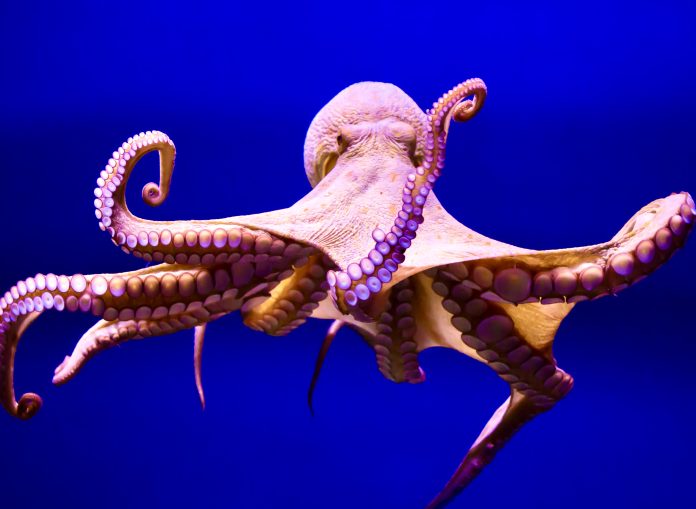Compassion in World Farming and Eurogroup for Animals are calling for the world’s first commercial octopus farm to be scrapped after plans obtained for the development revealed the animal cruelty and environmental consequences it would cause.
Both organizations have called on the European Union to not use public funds to support octopus farming developments, or any other new industrial animal-based farming in the light of significant and growing scientific evidence that it is killing our planet.
The plans, submitted to the General Directorate of Fishing of the Government of the Canary Islands by the company Nueva Pescanova and uncovered by Eurogroup for Animals, have raised a variety of serious concerns. These include the use of a cruel slaughter method, the confinement of octopuses in small barren tanks and practices that contribute to the overexploitation of wild fish populations. The campaigners’ concerns over the plans are outlined in a new report called Uncovering The Horrific Reality Of Octopus Farming.
“We implore the Canary Islands authorities to reject Nueva Pescanova’s plans and we urge the European Union to ban octopus farming as part of its current legislative review. It will inflict unnecessary suffering on these intelligent, sentient, and fascinating creatures, which need to explore and engage with the environment as part of their natural behavior. Their carnivorous diets require huge quantities of animal protein to sustain, contributing to overfishing at a time when fish stocks are already under immense pressure,” Elena Lara, Research Manager at Compassion in World Farming and author of the report, said in a statement. “Factory farming is the biggest single cause of animal cruelty on the planet, and it is literally destroying our earth. We should be ending factory farming, not finding new species to confine in underwater factory farms. We must end octopus farming now.”
Shockingly, an estimated one million octopuses will be reared at the farm in the Port of Las Palmas in Gran Canaria, Spain, producing some 3,000 tons of octopus each year.
The report also confirms animal welfare campaigners’ fears that a number of extremely concerning practices would be implemented, including that octopuses would be:
-
Slaughtered using cruel ice slurry: a highly aversive, inhumane method, scientifically proven to cause considerable pain, fear, and suffering, as well as a prolonged death.
-
Confined in crowded, barren underwater tanks that will result in poor welfare and risk aggression, territorialism, and even cannibalism due to the octopuses’ naturally solitary nature.
-
Exposed to round-the-clock unnatural light to increase reproduction, which will cause undue stress given the aversion these animals have to light.
-
Fed with commercial feeds containing fishmeal and fish oil as main ingredients, which is unsustainable and contributes to the overfishing of wild fish populations.
-
Raised within a land-based aquaculture system relating to higher risk of mass mortality due to the overcrowded conditions required for their profitability, as well as negative environmental impacts stemming from the excessive use of energy.



